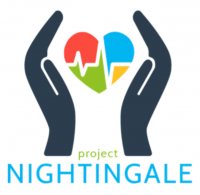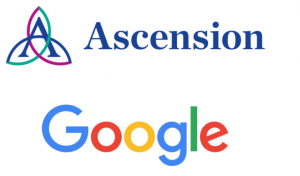Difference between revisions of "Project Nightingale"
| Line 17: | Line 17: | ||
}} | }} | ||
| − | '''Project Nightingale''' is a Google initiative that is meant to collect and analyze millions of patients’ personal-health information in the United States < | + | '''Project Nightingale''' is a Google initiative that is meant to collect and analyze millions of patients’ personal-health information in the United States <ref>https://www.wsj.com/articles/google-s-secret-project-nightingale-gathers-personal-health-data-on-millions-of-americans-11573496790/</ref>. The operation started in 2018, and has only become bigger as time has progressed. Google works with Ascension, the second largest healthcare system in the country that has 2,600 hospitals, to obtain access to over 50 million patients’ medical records (2). As Ascension is handing over data, in return they receive any new services that Google creates from the data. Ascension’s goal of working with Google is to improve its patient care system to centralize its electronic record-keeping processes by moving its data to the cloud. Google’s end goal is to be able to create tools (using the data and information) to identify and predict health problems before a patient visits a doctor, which helps with decision making for patient treatment. Project Nightingale has become an increasingly debated topic as lawmakers are seeking to gain more insight into the operations and ethics of this Google Project to see whether it is driving medical innovation or prioritizing Google’s profits. |
Revision as of 21:33, 9 February 2022
|
Project Nightingale is a Google initiative that is meant to collect and analyze millions of patients’ personal-health information in the United States [1]. The operation started in 2018, and has only become bigger as time has progressed. Google works with Ascension, the second largest healthcare system in the country that has 2,600 hospitals, to obtain access to over 50 million patients’ medical records (2). As Ascension is handing over data, in return they receive any new services that Google creates from the data. Ascension’s goal of working with Google is to improve its patient care system to centralize its electronic record-keeping processes by moving its data to the cloud. Google’s end goal is to be able to create tools (using the data and information) to identify and predict health problems before a patient visits a doctor, which helps with decision making for patient treatment. Project Nightingale has become an increasingly debated topic as lawmakers are seeking to gain more insight into the operations and ethics of this Google Project to see whether it is driving medical innovation or prioritizing Google’s profits.
Contents
How Google Started Working in Healthcare
Google was started on the foundation of providing information to consumers in convenient ways, in which the technology firm has major interest in using this within the healthcare industry. Project Nightingale is not the first healthcare venture that has started in Google.
Google Health started its development in 2006 as an online personal health records service that allowed people to enter, update and edit their health and wellness information (1). Google continued to develop this product for two years before live testing with 1,600 patients at the Cleveland Clinic. From there, the Google Health Beta Edition was released to the public in 2008 (3). Due to its lack of adoption and scalability, the electronic personal health records (PHR) platform closed its operations in 2012.
In 2018, the company attempted to re-launch its separate health division to consolidate the company’s health projects. However, it closed down its operations in 2021. This time around, Google Health had several projects such as Google Brain (focused on deep learning), Google Fit (focused on wearable fitness devices), and Project Nightingale (4). These projects have continued to be worked on, just within the research division of Google (4).
What Project Nightingale Uses
Before partnering with Google, Ascension used 40 data centers in more than a dozen states. Project Nightingale uses lab results, doctor diagnoses, hospitalization records, and lots of other medical information to analyze patient data; the amount of data compares to a complete health history, such as patient names, family member addresses, and dates of birth (5). This data is used with artificial intelligence and machine learning to create strategies that will improve patients’ treatment. These algorithms can help predict diseases a patient might have before a doctor has even diagnosed them.
Ethics of Project Nightingale
When the Wall Street Journal broke the news about the secret operation of Project Nightingale, doctors nor patients were not formally notified of the partnership between Google and Ascension (5). In 2019, The Office for Civil Rights in the Department of Health and Human Services sought to learn more information about Project Nightingale’s data collection to ensure that HIPAA protections were fully implemented. Under the HIPAA Privacy Rule, hospitals are allowed to share data with business partners without telling patients as long as the information is used ‘only to help the covered entity carry out its health-care functions (5).’” Experts state that Project Nightingale appears to be permissible under federal law as a spokeswoman stated the Ascension data wouldn’t be used to sell ads (5).
Ellen Wright Clayton, a professor of biomedical ethics at Vanderbilt University is worried that Project Nightingale will use the health data to perform independent research outside the direct scope of treatment for the patients (5). An anonymous whistleblower from the Google side came out and stated that those on the project team did not necessarily know which artificial intelligence algorithms were being used as the data was being transferred from the hospital groups to Google (6). When the report of the Project first came out, it had been claimed that over 100 Google employees had been able to access the data of patients tied to the Project (2).
With all data privacy issues, patients and health care providers are worried about the protection of their information. In 2021, one of the biggest cloud computing challenges for IT service providers was security of data (7). In 2018, Google was the victim of a major data privacy offense in which five million Google+API users had their private data exposed.
Competition
Google has a stronghold on the healthcare data segment. On May 26th, 2021, Google and HCA Healthcare, a national hospital chain, announced they are teaming up in a data sharing partnership (8). This partnership will allow Google to gain more access to a host of patient records with real-time medical information (8). However, other companies have or are starting to follow suit and use healthcare to create artificial intelligence tools and services. In 2016, IBM bought Truven Health Analytics for $2.6 billion for their healthcare data of tens of millions of medical records and years of health insurance data (9).
References
- https://www.wsj.com/articles/google-s-secret-project-nightingale-gathers-personal-health-data-on-millions-of-americans-11573496790
- https://www.proquest.com/docview/2370268359?parentSessionId=RsaEYDrrnNfdICB%2BRmNouaDI7%2Fj0qBHzaZnxVJsvXQg%3D&pq-origsite=primo&accountid=14667
- https://www-sciencedirect-com.proxy.lib.umich.edu/science/article/pii/S221188371400032X
- https://www.advisory.com/daily-briefing/2021/08/24/google-health
- https://bi-gale-com.proxy.lib.umich.edu/essentials/article/GALE%7CA616992563/70a0b51115d05f6514b1584a626adac6?u=umuser
- https://www.theguardian.com/commentisfree/2019/nov/14/im-the-google-whistleblower-the-medical-data-of-millions-of-americans-is-at-risk
- https://www.mindinventory.com/blog/cloud-computing-challenges/
- https://venturebeat.com/2021/06/20/googles-health-care-data-sharing-partnership-is-a-problem/
- https://link-springer-com.proxy.lib.umich.edu/article/10.1007/s12350-021-02671-1

